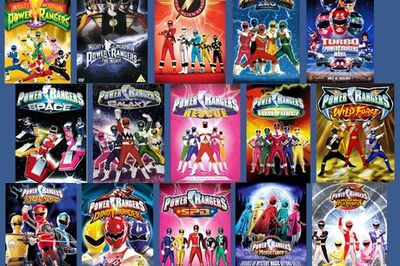
views
What does neurospicy mean?
Neurospicy is a new, playful way of saying “neurodivergent” online. “Neurospicy” is intended to capture the complexity of neurodivergence without necessarily sounding too serious (or being specific about the exact condition you might have). After all, “spicy” evokes the idea of vivid flavors—and similarly, “neurospicy” is all about the intensity and variety of neurodivergent personalities. Neurospicy is a descriptor often used by people who are neurodivergent themselves. It’s just a fun and less intimidating way to talk about being neurodivergent!
What is neurodivergence and neurodiversity?
Neurodivergent is an umbrella term for people with diverse thinking styles. A neurodivergent person is someone whose brain follows different thinking patterns than the established norm or experiences the world differently from what is considered “typical.” It’s not a condition itself; rather, neurodivergence encompasses many conditions. This includes: Autism spectrum disorder ADHD and ADD Down syndrome Dyscalculia Dysgraphia Dyslexia Dyspraxia Epilepsy Mental health conditions (like bipolar disorder, depression, OCD, and so on) Social anxiety Synesthesia Tourette syndrome Williams syndrome
Neurodiversity refers to a mix of neurodivergent and neurotypical people. It’s meant to capture the idea that there’s no single way a brain should work—and that there are many different ways of thinking across the human population. Neurodiversity is an inclusive word, acknowledging all people whose minds are neurodivergent and people with no noted differences who are “neurotypical.” Being neurodivergent isn’t necessarily a disability; some conditions under the neurodivergent umbrella are considered disabilities, while others aren’t. It’s been estimated that over a third of the population could be neurodivergent in some way.
The idea of neurodivergence evolved in the mid-1990s. The term “neurodiversity” was fist used in Australian sociologist Judy Singer’s 1998 honors thesis; it quickly became more widely known, as did terms like neurodivergent and neurotypical—both by academics and the public. The neurodiversity movement also emerged: a social justice movement advocating inclusion and acceptance for the neurodivergent population. The neurodiversity movement is also a disability rights movement, arguing that society should provide neurodivergent people equal access to care and support. However, some believe the neurodiversity movement doesn’t fully represent the complex needs of autistic individuals—especially those with high support needs.
Where does “neurospicy” come from?
There’s no clear point of origin for neurospicy. However, the significance of “neurospicy” (and terms like it) likely stems from the desire to change the narrative surrounding neurodivergence, and autism in particular. Neurotypical people sometimes use terms to “measure” autism (like “high-functioning” or “mild autism”), but those terms often end up undermining autistic people and their experiences. For example, autistic people with fewer support needs may be misunderstood or invalidated when labeled “high-functioning,” while terms like “low-functioning” can be disrespectful to people with more support needs and erase their innate strengths. In response to those terms, neurodivergent people have advocated replacing them with terms that more accurately reflect the complexity of their experiences—like “neurospicy.”
Is “neurospicy” a positive or negative term?
Some like “neurospicy” and feel it affirms the concept of neurodiversity. Neurospicy isn’t an official medical term; it comes from the online neurodivergent community. Because of this, some neurodivergent people consider it a fun and creative way to redefine how their minds work. The term “neurospicy” is also a way to push back against derogatory or offensive language referring to neurodivergent people. Neurospicy is considered a positive term because it can describe someone who experiences multiple types of neurodivergence—or a group of neurodivergent people (like a family or friend group). Additionally, some use “neurospicy” because it lets them convey that they’re neurodivergent without actually naming their diagnosis or condition.
Others feel uncomfortable using casual or silly terms like “neurospicy.” Although “neurospicy” isn’t inherently negative, some neurodivergent people don’t like it and feel it undermines and even erases their actual neurodivergent condition. For example, podcaster Danielle Sullivan questioned whether “neurospicy” was just a way for neurotypical people to avoid saying “disabled.” Ultimately, some resonate with the term, and others don’t, preferring to use “neurodivergent” or the name of their condition (like “autistic”)—but both sides are valid!
How to Use “Neurospicy”
Refer to yourself as “neurospicy” if you have a neurodivergent condition. As long as you’re neurodivergent and enjoy the idea of calling yourself “neurospicy,” there’s no reason not to describe yourself that way! It’s an especially helpful word when you don’t want a conversation to get too heavy, serious, or awkward. “I’m definitely a bit neurospicy!” “Got a diagnosis recently—apparently I’m neurospicy, haha. I suspected, but it’s good to have confirmation.”
Call other neurodivergent people “neurospicy” if they want you to. It’s important to respect people’s wishes. Ask them what terms they’re comfortable with, and use those terms going forward. In other words, if someone likes thinking of themselves as “neurospicy,” use it around them! If they don’t like the term, don’t call them neurospicy; use the terms they ask you to use instead. “Love hanging out with you and all our other neurospicy friends. We get each other!” “Since you’re also neurospicy, I’d love to get your opinion on this!”
Use the ????️ (hot pepper) emoji when you type “neurospicy.” Lots of people online have started including the ????️ emoji when they talk about being neurospicy because the pepper also conveys the idea of spice! It’s just another way to add a playful touch to the term and keep things light when discussing neurodivergence. “Let’s see more positive neurospicy representation in media! ????️” “We’re neurospicy and proud! ????️”




















Comments
0 comment